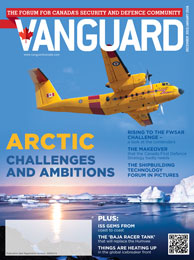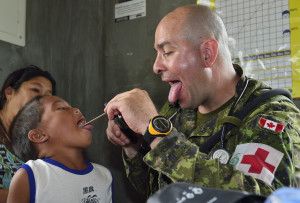For too long Canadian defence policy and operational priorities have lacked a degree of precision and purpose. Indeed, since 2006 the Harper administration has been pledging Canadian forces to an indiscriminate series of overseas and domestic military adventures without sufficiently clarifying how they will ultimately protect Canadian sovereignty, freedom of action, and/or values.
Our armed forces need direction and the grossly inadequate Canada First Defence Strategy (CFDS) with its deliberate hawkishness, equivocal declarations and unrealistic budgetary promises have done little to improve the country’s long-term commitment to defending North America, contribute to international peace and security, and/or project leadership abroad. Nor has it helped to fashion (or rebuild) Canada’s military into a well-integrated and effective fighting force.

We suspect that Prime Minister Trudeau and his staff are mindful of some of the serious limitations outlined in the CFDS. Yet, beyond the convenient optics of promising to cancel the Conservative Party’s F-35 fighter jet program, Canada’s military and defence spending have again been relegated to the position of a secondary or low bearing policy priority.
This needs to stop and the newly anointed Trudeau government has a genuine opportunity to put Canadian defence policy and strategy on a more solid footing.
Towards a more coherent defence policy
In this piece we examine the following questions: 1) What are Canada’s major security challenges? 2) Is Canada’s military the best option for addressing these challenges; and 3) What kind of equipment and training, in a normative sense, should be purchased and/or adopted to help the armed services become a more robust, technologically savvy, and defensively oriented entity.
Our motivation for presenting such a piece is two-fold. First, our hope is to encourage more public discussion and shed some light on what Canada’s military should be doing to maintain its readiness, usefulness, and integrity. In the presentation that follows, we will attempt to construct a brief, though not unimportant, framework from which to understand and present a more coherent national defence policy. Second, as a collection of policy options we believe that the new Liberal government in Ottawa might be able to draw some insight from these suggestions and modifications to ensure that Canada remains safe, and to restore the country’s reputation as an international “team player” committed to human security issues, peace-keeping, and regional defence.
To begin, we think that Ottawa needs to provide a more honest appraisal of existing global security conditions. The CFDS is largely inadequate in this regards and seems to place a great deal of emphasis on responding to ‘a world characterized by volatility and unpredictability.’ The reality, of course, is that while several non-military oriented challenges exist, we are not living in an era engulfed in a perpetual state of chaos, uncertainty, or violence. Hence, the assertion that Canada is now somehow more vulnerable than it is has been in the past is disputable. What, then, should we be worried about?

The North Atlantic Treaty Organization (NATO), the US Defense Department, and several security-oriented think tanks have identified five principal areas of concern. First, arms proliferation and specifically black-market access to nuclear, biological, and chemical weapons (and other “mass-casualty” devices) has/have been singled out as one of the more critical security challenges confronting high-income and liberal democratic states in the Northern hemisphere.
Remarkably, it has been suggested that Western governments currently lack the financial, technical, and enforcement tools needed to detect low-yield dirty bombs consisting of a few grams of radioactive material. Furthermore, preventing the spread of a deadly virus in an unconventional biological attack has been noted as difficult, given the inability to impair or disrupt trade in these types of dangerous goods. The belief here is that at some point, some group, known or unknown, will acquire a weapon of mass destruction (WMD) and use it against a sovereign state. While this is a legitimate scenario, we would add that it is also a highly unlikely one—see Dan Gardner’s 2008 book titled, Risk: The Science and Politics of Fear, for more detail on this issue—and in any event, it remains uncertain what the Canadian military’s role would be in this regard. To our minds, this ‘challenge’ would appear to fall within the jurisdiction of an integrated intelligence, law enforcement, border control, coast guard, and foreign affairs unit or task force, not Canada’s army, navy, or air force.
A second area of concern is the crippling effect(s) of a well-orchestrated cyber-attack or series of attacks. “Systems-wide” connectivity, especially in places like Canada, is indispensable and definitive, but also assailable. Though this is hardly a revelation, recent encounters with China and anonymous hacker groups have placed many Anglo-liberal governments on high alert. Unleashing a malicious infection, espionage, theft of intellectual property and money, and various types of fraud and extortion abound in the digital universe and can be very destructive. Be that as it may, the perceived levels of digitally inspired criminal behavior have been met by computer users increasingly aware of their own evident vulnerabilities—this is not to assert that an impervious wall to any and all forms of probing has now been erected, but rather to point out a useful and emergent self-awareness developing around “data communities” opposed to cyber-crime. As well, there would seem to be concerted and coordinated efforts by many national governments (of both the democratic and non-democratic variety) to neutralize the impact of information warfare on critical infrastructure and other important public assets and services. For our purposes, however, unless these measures are being deployed on the battlefield, the role that Canada’s military should be playing in relation to combatting cyber-security would seem negligible at best.
Climate change, crime and terrorism
Unsurprisingly, climate change and transnational crime/terrorism have also been appraised and presented as two additional challenges to NATO’s member states. Referred to as an “enduring trend,” global warming has caught the attention of senior strategic planners because it is believed that an integrated military response will be needed, in many instances, to allay the lateral effects associated with droughts, flooding, and/or weather-related agricultural disruption. More specifically, it has been argued that rapid deployment teams will be needed to provide humanitarian relief when and where violent natural disasters materialize. On this count, we envisage a continued positive role for Canada’s armed forces and would add that our special operations units can provide indispensable protection services for civilians in regions where “warlords” might attempt to perpetuate conditions of poverty, malnutrition, and illness by appropriating essential aid resources.
Find other engaging content 
in the Dec-Jan 2016 issue of Vanguard Digital. Click here.
On the matter of national or transnational crime, such as money-laundering, tax evasion, racketeering, hijacking, and/or home-grown terrorism, it is less clear how Canada’s conventional forces can, should, or would be deployed to meet criminal acts of this nature. Traditionally, crimes like this have been left to federal policing, border services, and intelligence agencies. We would concede that Canada’s military can be used to address a range of symmetrical and asymmetrical threats. Yet, fighting organized crime or contributing to a tenuous “war on drugs” is not a military responsibility; it is an intelligence, police, and border security one. Moreover, “fighting terrorism” is a nebulous concept, and Canadians need to be given more information on what constitutes a legitimate national security threat, why it needs to be defused, and how our military can contribute to this goal by carrying out its principal function: National Defence.

To be sure, there is very little hard evidence supporting the notion that executing “extermination” operations of insurgents make us safer or more secure. Tellingly, the opposite might very well be the case if we consider how ‘capture and kill’ engagements can lead to a measure of ‘blow-back’ or retaliation—see Chalmers Johnson’s book, Blowback: The Costs and Consequences of American Empire, for more clarity on this issue. In all, the putative “arc of instability,” from West to East Africa to Pakistan may cause some problems for Canada’s allies in the future, but is it a security challenge best resolved by resorting to blunt force?
Challenges posed by Russia and China
Finally, Vladimir Putin’s gratuitous saber-rattling and a resurgent—and more assertive—China have been pitched as critical impediments to the West’s broader strategic plans for Asia and Europe. Curiously, there would appear to be a lingering assumption that China and Russia are now agitating for war—for example, Chinese Admiral Wu Shengli’s recent warning to the US Navy to respect China’s (still unsettled) territorial claims in the South China Sea, or US Defense Secretary Ashton Carter’s attempt to present Russia and China as a long-term risk to world peace. Canada’s armed forces could provide a moderate level of assistance should China or Russia behave in an undeniably belligerent fashion, but for all their bluster, neither one of these country’s actually possess the means to contest or undermine Canadian sovereignty and/or American hegemony in the Pacific—and are generally more inclined to avoid conflict with the United States.
Looking forward, this list—and the accompanying assessments—suggest a more clearly defined and limited role for Canada’s armed forces—we understand that this is not an exhaustive list, but it is nevertheless more realistic than the CFDS’s reductivist “realpolitik” portrayal of global politics. We feel that it can also inform the equipment/asset purchases and training priorities that will need to be considered to ensure that Canada is actually prepared to meet some of these challenges in the future.
With this in mind, where should the Trudeau administration concentrate its efforts and what will Canada’s military need to perform its primary mission objectives? We think that there are three critical areas to take into account and they include: (1) legitimate territorial defence and claims (that is, protecting the country’s sovereignty); (2) humanitarian assistance and a return to our role as peace-keepers; and (3) collaborating and supporting paramilitary or law enforcement and border security operations when deemed necessary by the government.
On the issue of territorial defence, we have argued previously (Vanguard Oct/Nov 2014)that Canada does not need a brand new inventory of fifth generation fighter aircraft—a healthy number of attack and surveillance drones would be better in almost every modern operational context (and cheaper!). Nor do we need long range coastal patrol vessels that may or may not cut through thick blocks of ice to secure our northern frontier.
This may come as a surprise to some, but Canada, for all intents and purposes is un-defendable—especially given our current “commitment” to national defence. Yet, this is not to say that we should completely dismiss the possibility of another “cold war” from emerging, or rely (exclusively) on US military guarantees. Territorial sovereignty remains at the heart of every national defence system.
Should a conflict materialize, we don’t need to defeat Russia or China. Rather, all we need to do is make the idea of an incursion untenable. To do this, Prime Minister Trudeau will need to consider the merits of bolstering our early warning and detection platforms (radars and satellites) and a strategic missile defence scheme. “Smart,” adaptive, and supersonic ballistic missile systems are affordable, integrative, and easy to command and control, and send an unequivocal signal to potential aggressors.
With regards to Canada’s role in the international realm, now is the time to abandon our impetuous vow to eliminate insurgencies in the Middle East, and focus instead on humanitarian operations. Undoubtedly, these will crop up in myriad forms related to climate change, failed states, and civil wars. Training and expanding on rapid deployment relief and protection teams will be critical and will necessitate a more robust budgetary commitment to specialized tasking missions. Again, this is a cheaper alternative to establishing permanent bases of operation for the purpose of bombing militants or neutralizing religious nihilists and will demonstrate Canada’s commitment to alleviating fear, illness, destitution, and so on in cases where impoverished peoples become the victims of their already vulnerable circumstances. In essence, it will make Canada look like it actually cares about defending innocent civilians against the disorder that accompanies natural disasters or violent power struggles in less stable regimes.
Finally, we think that Canada’s armed forces can also be used in a supplemental manner to support efforts to mitigate the trafficking of dangerous substances. Whether it is narcotics or NBC materials, we can imagine Canada’s more asymmetrically inclined military units performing a useful secondary function, and mainly in terms of interception and confiscation. However, we would stress that such a role would have to be sanctioned by the government and that joint command and control measures would need to be established with the Royal Canadian Mounted Police (RCMP), the Canadian Border Services Agency (CBSA), and the Canadian Security and Intelligence Service (CSIS). We appreciate that this would likely entail an increase in the RCMP’s, CBSA’s, and CSIS’s current budgetary allotment, but if the Trudeau government is genuinely concerned about protecting Canadians from these kinds of contingencies, then they will need to accept these costs.
Ultimately, the changes that we are proposing to Canada’s existing defence posture will make our military more effective and affordable in both a domestic and global sense. Additionally, these recommendations will align better with Canadian values, beliefs, and broader foreign policy preferences.
Our men and women in uniform deserve the best. They are selfless and can embody all that is good and exceptional about Canada. Ottawa’s new Liberal government simply cannot afford to betray their confidence any longer. In the end, Canada’s national security requirements can be better contextualized and addressed, in an age of fiscal austerity, but only if our leaders focus on what really matters and take into account the country’s limited capacity to contribute, and the ‘reality’ of our global strategic environment.
Dr. Jason Lacharite is an Assistant Professor in the Department of Political Science at the University of Northern British Columbia. His co-author, Lieutenant-Colonel (Ret’d) Richard Lacharite served for 38 years in the Canadian Armed Forces, including as a staff officer at NATO headquarters in Brussels and SACLANT in Norfolk, Virginia.


